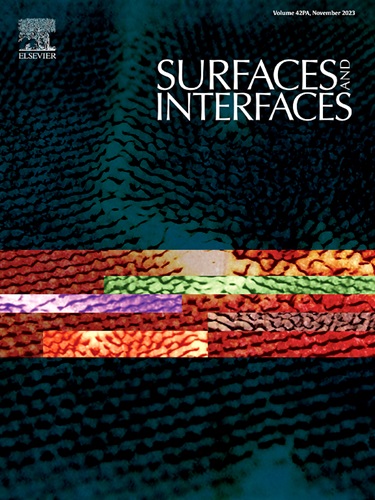A ternary-structured NiCo-LDH/Ni/BiVO4 photoanode with enhanced charge dynamics for photoelectrochemical water splitting
IF 6.3
2区 材料科学
Q2 CHEMISTRY, PHYSICAL
引用次数: 0
Abstract
Solar-driven photoelectrochemical (PEC) water splitting is one of the promising technologies to produce green hydrogen as the carbon-free energy carrier. However, the ideal photoanode material BiVO4 still suffers from sluggish carrier dynamic problem. Here, NiCo-LDH/Ni/BiVO4 (NC/N/BVO) composite photoanode with a three-layer structure was successfully fabricated by introducing Ni layer followed by NiCo-LDH on BiVO4 by magnetron sputtering and electrochemical deposition, respectively. The optimized structure of NC/N/BVO exhibited a photocurrent of 4.15 mA cm−2 (1.23 VREH) in neutral solution, which was 2.8 times of pristine BiVO4. Besides, the photocurrent can be well maintained at 98 % for NC/N/BVO in 1h reaction, which dramatically decreases to 60 % for BiVO4. In this composite photoanode, NiCo-LDH as excellent water oxidation catalyst can effectively enhance the kinetic process of water oxidation on the surface, while the introduction of Ni layer can not only promote the following deposition of NiCo-LDH being a finer nanostructure with high surface area, but also increase the charge conduction efficiency and promote the charge transfer process between NiCo-LDH and BiVO4 substrate. The appropriate deposition sequence of Ni and NiCo-LDH layers ultimately highly improved the charge injection efficiency of NC/N/BVO resulting in a high performance of PEC water splitting.
用于光电化学水分离的具有增强电荷动力学的三元结构镍-LDH/镍/硼-氧化钛光阳极
太阳能驱动的光电化学(PEC)水分裂技术是生产绿色氢气这种无碳能源载体的前景广阔的技术之一。然而,理想的光阳极材料 BiVO4 仍然存在载流子动态迟缓的问题。本文通过磁控溅射和电化学沉积技术,在 BiVO4 上引入镍层和镍钴-LDH,成功制备出三层结构的镍钴-LDH/镍/BiVO4(NC/N/BVO)复合光阳极。优化后的 NC/N/BVO 结构在中性溶液中显示出 4.15 mA cm-2 (1.23 VREH)的光电流,是原始 BiVO4 的 2.8 倍。此外,在 1 小时的反应中,NC/N/BVO 的光电流能很好地保持在 98%,而 BiVO4 则急剧下降至 60%。在这种复合光阳极中,NiCo-LDH 作为优良的水氧化催化剂,能有效增强表面的水氧化动力学过程,而镍层的引入不仅能促进 NiCo-LDH 的后续沉积,使其成为更精细的高比表面积纳米结构,还能提高电荷传导效率,促进 NiCo-LDH 与 BiVO4 衬底之间的电荷转移过程。镍层和镍钴-LDH 层的适当沉积顺序最终大大提高了 NC/N/BVO 的电荷注入效率,从而实现了高性能的 PEC 水分离。
本文章由计算机程序翻译,如有差异,请以英文原文为准。
求助全文
约1分钟内获得全文
求助全文
来源期刊

Surfaces and Interfaces
Chemistry-General Chemistry
CiteScore
8.50
自引率
6.50%
发文量
753
审稿时长
35 days
期刊介绍:
The aim of the journal is to provide a respectful outlet for ''sound science'' papers in all research areas on surfaces and interfaces. We define sound science papers as papers that describe new and well-executed research, but that do not necessarily provide brand new insights or are merely a description of research results.
Surfaces and Interfaces publishes research papers in all fields of surface science which may not always find the right home on first submission to our Elsevier sister journals (Applied Surface, Surface and Coatings Technology, Thin Solid Films)
 求助内容:
求助内容: 应助结果提醒方式:
应助结果提醒方式:


